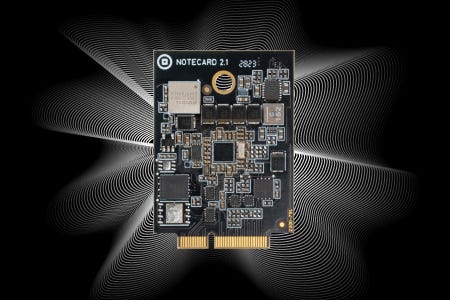IoT Product Roundup: Nokia, ABB, Wiliot and More
The latest products from the world of IoT

From Nokia’s new data suite for artificial intelligence and machine learning development to ABB’s launch of its first modular software platform and new industrial education robot, here are some of the latest products from the world of IoT.
Nokia Launches AVA Data Suite for AI/ML Development
Nokia has launched its AVA Data Suite, designed to run on Google Cloud, to help communication service providers (CSPs) standardize data and facilitate the development of AI/ML software applications.
The new suite offers CSPs and data scientists standardized, pre-correlated data product packages across 4G, 5G and fixed domains.
According to the company, the suite is intended to accelerate the development of AI solutions for “enhanced network performance and sustainability, improved subscriber experience, and new revenue streams.”
“CSPs have experienced high costs, long lead times, and lack of agility when implementing AI/ML projects due to challenges associated with preparing and accessing high-quality data sets for these projects,” said Adaora Okeleke, principal analyst at Analysys Mason. “Nokia’s AVA Data Suite on Google Cloud will help resolve these challenges by providing a suite of curated network and IT datasets which can form a common data layer that can be exposed and consumed to accelerate an AI/analytics model, application development and operations."
“The integration of Nokia AVA Data Suite with Google Cloud provides CSPs with a standard library of high quality reusable network and IT data products,” said Vivek Gupta, Google Cloud’s head of Telco AI solutions. “This collaboration will help CSPs unleash the full potential of artificial intelligence and machine learning to build, manage and maintain their networks.”
.png?width=NaN&auto=webp&quality=80&disable=upscale)
ABB Launches OptiFact Software, Educational Robot
ABB unveiled a range of new automation and robotics tools at the 2023 China International Industry Fair (CIIF), including two new products: OptiFact, ABB’s first modular software platform and its new IRB 1090 industrial education robot.
“Robotics is experiencing significant growth due to global megatrends including a shrinking workforces, supply chain disruptions and a fundamental need to operate more sustainably and efficiently,” said Marc Segura, ABB Robotics Division’s president. “Our new OptiFact software helps businesses collect and analyze data from the factory floor to improve decision-making and enhance processes and performance, while our new IRB1090 educational robot will help equip the next generation with the skills to thrive in a new era of automation.”
According to ABB, OptiFact can increase production capacity by up to 20% by reducing downtime and tracking KPIs to improve decision-making.
ABB’s IRB 1090 robot is designed to provide education and training to students in robotics and other Industry 4.0 technologies. The robot comes with 100 free licenses to RobotStudio, ABB’s leading robotics planning and programming software.
Wiliot Launches Humidity Sensing Capabilities for Supply Chain
Wiliot has launched new humidity sensing capabilities on its IoT Visibility Platform, providing new levels of insight into individual product conditions throughout a supply chain.
The new feature adds to the platform’s existing temperature, location and carbon emissions sensing capabilities, creating a holistic solution to ensure supply chain resilience and transparency that the company said is “unlike any traceability technology available today.”
“This is a game-changing technology achievement for supply chain visibility,” said Thaddeus Segura, Wiliot’s vice president of data products. “By adding humidity sensing to the Wiliot Visibility Platform, we are transforming the handling of products we all consume and depend on.”
Wiliot’s Visibility Platform leverages the company’s asset-tracking solution, the IoT Pixel. These postage stamp-sized devices attach to products and packaging and monitor conditions such as temperature and location, with the data then sent to the Wiliot Cloud to enable real-time monitoring and analysis.
The new humidity sensor is attached to the IoT Pixels via a small membrane which, when exposed to different humidity levels, transmits this information to the cloud.
.png?width=545&auto=webp&quality=80&disable=upscale)
Digital Matter Introduces Battery-Powered Tracking Device Range
IoT asset tracking provider Digital Matter has announced the expansion of its asset tracking portfolio, with a new ‘Barra’ device range.
The Barra family is a low-cost, battery-powered series featuring three product variations — Barra Core, Barra Edge, and Barra GPS — to meet a range of customer needs ranging in location, accuracy and price requirements.
According to the company, the Barra range allows businesses to monitor assets that “previously presented return on investment hurdles” due to expenses linked with existing tracking solutions, including pallet tracking, cargo, trolleys and packaging.
“We wanted to make a cellular-based tracker that is more affordable than most decent Bluetooth tags, has up to 10 years battery life and still delivers the performance expected from a Digital Matter device,” said Ken Everett, Digital Matter’s CEO.
The Barra range is also designed to be deployed once and last 10 years, improving sustainability by eliminating recharging cycles and frequent battery replacements.
Blues Expands Notecard Offerings for Enhanced IIoT Connectivity
Blues has expanded its IIoT offerings based on its flagship product, Notecard, a device-to-cloud connectivity device.
The expanded Notecard offerings include Notecard Cell+WiFi, Notecard WiFi, Notecard LoRa, and Notecard Chips Edition options. The expanded capabilities enable a wider, and customizable, range of connectivity options, offering reliable and hybrid connectivity, positioning accuracy, and scalable development that a customer can switch between depending on their needs.
According to Blues, customer demand for connectivity within “a broad variety of real-world environments” drove the latest update.
"Blues understands that multiple connectivity options are necessary to empower businesses to transform physical products into data-driven intelligent services,” said Jim Hassman, Blues' president. “With the expansion of our Notecard offerings, companies now have the flexibility to optimize their connection method for sending and receiving information between devices anywhere, at any time.”

About the Author
You May Also Like








